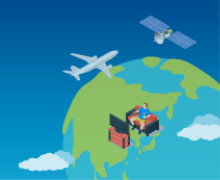- Sustainability
- Materiality
- Expert Opinions
FY2020: Expert Opinions (On the Identification of Materiality Themes)
From the Perspective of ESG Investment
March 25, 2021
Profile
 Principal Sustainability Strategist, Deputy General Manager
of Corporate Planning Dept.,
Principal Sustainability Strategist, Deputy General Manager
of Corporate Planning Dept.,
Mitsubishi UFJ Research and Consulting Co.,
Ltd.
Adjunct Lecturer, Keio University Graduate School of Media and
Governance
Ms. Mari Yoshitaka
Worked at IT companies and American investment banks. MSc and PhD from the School for Environment and Sustainability (SEAS) at the University of Michigan. Started the Clean Energy Finance Division at Mitsubishi UFJ Morgan Stanley Securities (MUMSS) in 2000. Engaged in environmental financial consulting for many years. Offers advice, gives lectures, conducts research, etc. concerning ESG investment and SDGs business in diverse sectors. Concurrently holds a position at Solutions Products Division of MUFG Bank and Corporate Communications Division of MUMSS. Also serves as a temporary member of the Global Environment Committee of the Central Environment Council of the Ministry of the Environment. Current position since May 2020.
High expectations of an innovative approach to the materiality of climate change using satellites and data
From among the materiality themes identified by the SKY Perfect JSAT Group, in my opinion the Group should accord the top priority to climate change. The Japanese government declared its intention of achieving carbon neutrality for Japan. Meanwhile, compliance with the Task Force on Climate-related Financial Disclosures (TCFD) is becoming the global norm, and many Japanese companies have endorsed the TCFD recommendations and started initiatives. In these circumstances, it is critically important to show how the SKY Perfect JSAT Group views environmental issues.
In regard to the materiality theme “building resilient broadcasting and communications infrastructure, eliminating information gaps,” I recommend making the theme into a business story of “through our main business, we will utilize broadcasting and communication infrastructure and data to build infrastructure resilient to climate change, and also support CO2 reduction.” In this way, you can communicate the theme as something that contributes to climate change in addition to society (S). With regard to “development and promotion of remote sensing,” I recommended the SKY Perfect JSAT Group to emphasize its contribution to the environment.
I made these suggestions at the dialogue. Following subsequent discussion in house, the SKY Perfect JSAT Group identified “contributing to the environment to make a decarbonized society and circular economy a reality” as a materiality theme. Moreover, regarding “reduction of CO2 emissions by promoting use of renewables and improving energy efficiency of satellites and terrestrial facilities” and “support reduction of CO2 emissions via satellite services,” the SKY Perfect JSAT Group has clarified its aspirations to reduce the Group’s CO2 emissions and also support other companies in their efforts to shift to renewable energy. I think these are good choices because these materialities communicate the Group’s commitment to addressing climate change.
In an international setting, human rights are highlighted along with climate change, and Japanese companies’ limited awareness concerning human rights is a concern. “Appropriate action for content involving violence, human rights, discrimination, etc.” is an issue that should be emphasized by the SKY Perfect JSAT Group as a media platform provider. The way in which the SKY Perfect JSAT Group implements its ethical code for broadcasting is extremely important. I encourage the Group to act with high awareness of the issues.
Institutional investors around the world believe that companies that embrace diversity are more likely to create innovation. In Japan, gender inequality is viewed as a major problem. But in fact, not only the male-oriented composition but also decision-making by an excessively homogeneous management team is considered to be a management risk. This issue cannot be resolved in the short term; instead, a long-term roadmap is required. Furthermore, it is necessary to consider how to expedite the process and present the plan. In this regard, setting key performance indicators (KPIs) for the materiality theme “activities by a diverse array of people” will be important.
Other expert third-party opinions and dialogues
FY2023
- Dialogue with Expert (Overall Sustainability)
- Dialogue with Expert (Environment)
- Dialogue with Expert (Human Capital)




